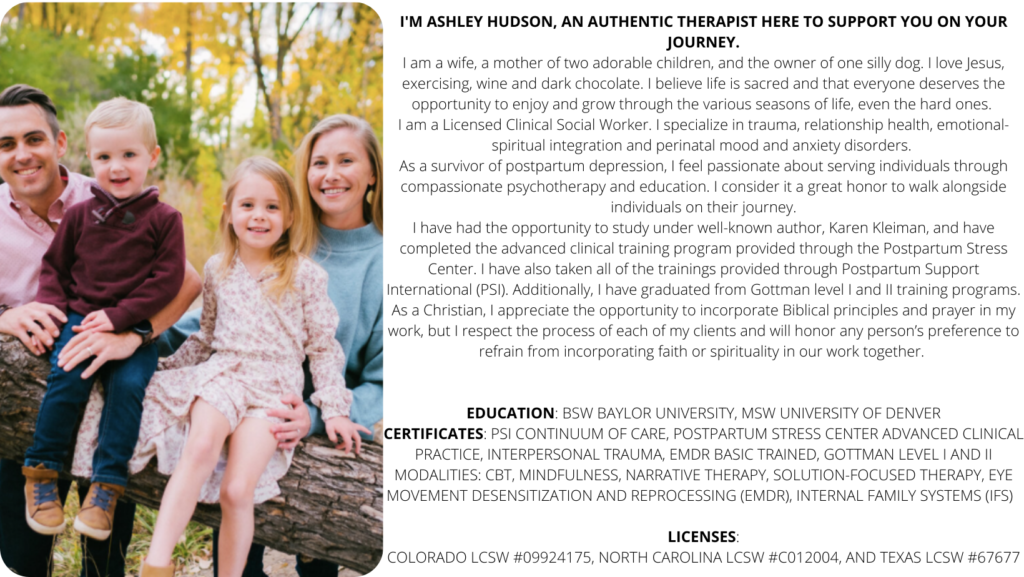by Ashley Hudson, LCSW
I could hear the muffled cry of my infant as I hid under the rack of hanging clothes in my dark closet. I was 5 months postpartum, and felt unspeakably lonely despite the flow of heart-felt casseroles and prayers of friends. I was in the midst of a loving community, yet I felt like I was alone floating in the middle of an ice-cold ocean. I was tired, and continually being called on to hold my infant when all I wanted and needed was to be held, myself. This was my rock bottom. I clenched my pill-filled fist, believing that my only point of escape from suffering was to end my own life. Thankfully, my plan was interrupted and I found myself tear streaked on the couch, glaring at HGTV reruns and holding a lukewarm cup of coffee. My husband swiftly intervened, scheduling an appointment with my OB and ensuring that I had the resources I needed to find my way out of what was diagnosed as Postpartum Depression.
You see, perhaps what is most ironic about this story is that I, myself, was a therapist at that time. I had been trained and working in the field of mental health for years. Yet, I was blind to my own diagnosis. I had never had a lesson, let alone a class, on Perinatal Mood Disorders, and I had no idea that over 400,000 infants a year were born to a mentally ill parent. After my own recovery, I quickly devoted my time and efforts to raising the volume on the topic of perinatal mental health in an effort to ensure that life was no longer stolen from people during the very season that life and love are meant to be multiplied.
Sadly, suicide is the leading cause of maternal mortality within the first year following childbirth, and maternal suicide is most commonly completed between months 6 and 12 postpartum. One in 5 women struggle with what is now referred to as Perinatal Mood and Anxiety Disorders (PMADs). Perinatal refers to the season of pregnancy and postpartum. PMADs are conditions impacting both pregnant and postpartum individuals and their families. PMADs refer to more than Postpartum Depression – PMADs include a wide variety of psychological disorders impacting birthing people all across the globe.
Some of the diagnoses we see during the perinatal phase (most of which are not regularly screened for by medical providers) include Perinatal Anxiety, Perinatal Obsessive Compulsive Disorder, Postpartum Posttraumatic Stress Disorder, Perinatal Bipolar, Postpartum Psychosis, and Perinatal Depression. Among these diagnoses, Postpartum Depression is the only diagnosis regularly screened for by pediatricians and OBGYNs in some states and countries.
Some symptoms that accompany PMADs include frequent tearfulness, rageful outbursts, inability to sleep when the baby is sleeping, lack of need to sleep, pressured speech, rapid weight loss, loss in appetite, heart palpitations, panic attacks, inability to control intrusive thoughts, obsessions related to child safety that lead to compulsive tendencies impacting daily living (compulsive washing, cleaning, checking, inability to leave the house, etc.), frequent thoughts of death or “falling asleep and not waking up,” and delusional thoughts related to baby or personal identity as mom, just to name a few.
It is important to note that mothers do not present with all of these symptoms, and oftentimes these symptoms can be subtle – making it difficult to identify. Historically, the media has used events related to Postpartum Psychosis as a representative of PMADs, clouding the facts of how these conditions actually present. The truth is that Postpartum Psychosis impacts only 1-2 of every 1,000 deliveries, and typically mothers with this condition experience hallucinations and delusional thinking. Postpartum Psychosis is extremely rare, yet when it occurs it is considered a medical emergency and requires immediate intervention.
Far more common than Postpartum Psychosis is Postpartum Anxiety and Postpartum Depression. Postpartum anxiety typically presents through feelings of heightened paranoia, racing or intrusive thoughts, excessive fear of harm coming to the baby, and a compulsive need to control surroundings and baby’s schedule. Typically these mothers are unable to sleep, even when the baby is sleeping, and their anxiety causes extreme discomfort. Postpartum Depression often presents as frequent tearfulness, a feeling of dread and impending doom, inability to sleep even when the baby is sleeping, a predominantly negative experience of motherhood marked by regret, rage, and frequent thoughts of needing to escape through death or leaving the family. Postpartum Anxiety and Postpartum Depression are both treatable through therapy, lifestyle adjustments, and pharmacological interventions.
One of the most dangerous observations I have made as a therapist is the lack of proper education of medical providers on the topic of PMADs. There are two myths that I will take some time to bust before giving clear thoughts on how to identify and respond to PMADs.
- The first myth is that PMADs only occur immediately after birth or within the first year postpartum. Many moms are diagnosed with an antepartum condition, meaning their mental health diagnosis is brought on by pregnancy. Treatment of this condition is different from treatment of a mood disorder unrelated to the perinatal season because of her life-transition and unique biological experience. Additionally, many of the PMADs (with the exception of Postpartum Psychosis), can endure far past the first year postpartum, particularly if they go untreated. A PMAD in the postpartum season can be triggered by a number of conditions, such as weaning a baby.
- The second commonly held misconception is that the presentation of extreme anxiety or symptoms of depression is “just baby blues.” Any uncomfortable symptoms that are experienced past day 12-14 postpartum are no longer considered baby blues. It is sadly common for a doctor who is uninformed in Perinatal Mental Health to blame a mother’s symptoms on “the stress of becoming a parent.” I urge you, if you are suffering, please keep speaking! I know you are tired, but you deserve to be heard. If you do not like the way you are feeling, you deserve to feel better. This is not your fault, you are not alone, and with the proper support you will be well!
There are a number of ways one might identify a mood or anxiety disorder. For support people, I recommend utilizing a casual conversation. Ask questions such as: How are you feeling about becoming a parent? What has this process been like for you? You know, I have heard a lot of moms have scary thoughts after having a baby, have you had any of those? How do you feel about them? Are you able to sleep at night when everyone else is sleeping? These are just a few questions I like to use in casual conversation to help indicate if there could potentially be an underlying diagnosis. Additionally, it is important to simply notice her behavior. Is the mother acting more docile than before the baby came? Is she more tearful? Is she refusing to leave the house, or showing excessive concern about particular elements of baby’s care? Was she social before she had the baby and now is more reclusive? If there are changes to her personality or behaviors during the perinatal season, it might be appropriate to ask some of these screening questions and speak with her about getting additional support.
Formal screening instruments do exist and can be accessed online, but these should not be used for diagnosing individuals with a PMAD. Instead, these are great tools to indicate whether further evaluation could be needed by a therapist trained in PMADs. Some of these formal screeners include the Edinburg Perinatal Depression Scale (EPDS), which screens for depression and the Perinatal Anxiety Screening Scale (PASS), which screens for anxiety.
For parents, I encourage you to be very aware of how you are experiencing parenthood. Only you know if you are experiencing thoughts that are scary and hard to control. Only you know if you are struggling with excessive insomnia, or if you are feeling despair or disruptive anxiety. It might be important for you to pause and notice if you are feeling more negative emotions than positive ones. Do you like the way you’re feeling? If not, it’s important for you to get support! This could be such a better experience for you.
If you know someone with a Perinatal Mood Anxiety Disorder, there are a few things you can do to provide support and comfort. First, it is important for you to extend your presence. Simply listen. You do not have to solve things immediately, she cannot snap out of this condition any more than she could snap out of the flu or COVID-19, so provide space for her to simply be raw and real with you. Second, offer sympathy. Do not compare your experience to hers. Offer statements such as “this is so unfair and sad, I am sorry you are going through this.” Third, connect her with a therapist as soon as possible. You can find therapists who are trained in Perinatal Mood and Anxiety Disorders at psidirectory.com. You may need to call the therapist on her behalf, since symptoms of PMADs can be lethargy, apathy, and a sense of overwhelm. Offer to walk this journey with her. If a mother is actively suicidal, she needs to be taken to the nearest Emergency Department or crisis center.
It is important for all moms who are suffering to know that this is not her fault. There is nothing wrong with her character, her personality, or her baby. You are experiencing an illness, and you deserve to get treatment. You are not alone, and with the proper support, you will get better!
For anyone interested in learning more about PMAD, Ashley will be giving a Webinar on May 24th at 6:30 EST. Here is the registration link.


